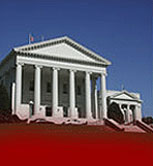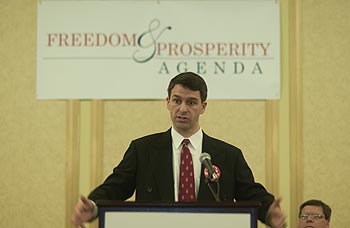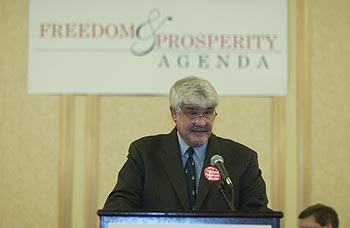

“Adherence to men is often disloyalty to
principles.”
– John Taylor of Caroline
|
|

A
Citizens' Agenda
for Better State Government
|
"A lot of these planks are about trust – restoring public trust in government and holding the government accountable for the promises it makes." -- Virginia Attorney General Ken Cuccinelli |
A coalition of Virginia citizen groups and legislators came together to introduce the Freedom & Prosperity Agenda — a citizens’ agenda for better state government that protects the properties, incomes, and futures of all Virginians. These 12 planks were proposed as legislation in a multi-year effort to shift power from the government back to its rightful owners — the people. As you can see, some planks have already been passed, while others require increased grassroots support of people across Virginia — you, your family, and your friends and neighbors – to ensure our state legislators pass them into law.
CLICK HERE TO FIND OUT WHAT YOU CAN DO
TO SUPPORT THE AGENDA
THE PLANKS:
1. Eliminate Virginia's death tax PASSED
Death (or estate) taxes are very large taxes that the state and federal governments collect from citizens after they die. Sure, you’ve already paid income taxes, property taxes, sales taxes, and many other taxes on your money and property during your lifetime, but this is one last grab from government when you can’t fight back. The taxes are due just a few months after death, so often the family business or family farm has to be sold to pay them. Not only are businesses and farms destroyed, but so are all the jobs they created.
For more information on eliminating Virginia's
death tax:
Oops, Weren't We Going to Lower the Death Tax?
2. Pass a Taxpayers Bill of Rights to limit excessive state spending
Out-of-control government spending is a cause of higher taxes and financial instability for the state. A constitutional amendment creating a Taxpayers Bill of Rights (TABOR) would limit increases in state spending to the rate of population growth plus inflation. It would also require any annual surpluses be refunded to the taxpayers, unless a public referendum allowed the government to use the excess revenue for a specific purpose. A public referendum would also be required before the legislature could raise the spending limit.
For more information on passing a Taxpayer's
Bill of Rights in Virginia:
a. Virginia Institute for Public Policy TABOR Study
b. Spending Reform, Not Tax Reform
“We must not let our rulers load us with perpetual debt. We must make our election between economy and liberty or profusion and servitude.” -Thomas Jefferson |
3. Stop unnecessary eminent domain confiscations of private property PASSED
In Virginia, state and local governments have the authority (called eminent domain) to force citizens to sell their property to the government for “public uses” such as building new roads or schools, or for public utilities. However, the definition of “public use” has been stretched to extremes, and increasingly governments are taking homes and businesses and giving the property to private developers to build more expensive homes or larger business enterprises for the purpose of generating higher tax revenues.
Virginia’s laws must be reformed to protect private property, beginning with redefining “public use” to prohibit governments from taking property that they intend to turn over
to private entities for private purposes.
For more information on limiting the public uses for which private property may be confiscated from private citizens:
4. Allow parents to choose where their children attend school PASSED
Since 1980, inflation-adjusted spending for K-12 education in Virginia has been increasing ten times faster than enrollment. Despite the fact that the U.S. leads the world in per pupil spending, the National Center for Education Statistics reports that 65% of Virginia’s public school students score below their grade levels.
We know: 1) the government has a near-monopoly on K-12 education; 2) monopolies always produce an inferior product at a very high cost; and 3) the government assigning a child to a particular school because of its location makes no more sense than a person being assigned to a particular college or hospital because of its location.
If parents’ tax dollars are paying for the education of their child, then the parents should
have the choice as to which school best meets the needs of their child. Tax credits for all
families, rich or poor, would help them afford the public or private schools of their choice.
For more information on allowing parental choice in education:
| a: | School Choice and Taxpayer Relief | |
| b: | The Universal Tuition Tax Credit: Achieving Excellence in Education without a Tax Increase |
5. Put Virginia’s budget and expenditures online to allow citizens to monitor their government PASSED
At a time when the Virginia government is spending more than ever before and yet is struggling to balance its budget, taxpayers should be able to easily access the details of how their tax dollars are being spent and what results are achieved for those expenditures.
The state’s budget, revenues, taxes, and even individual expenditures must be posted on
the Internet in a searchable database in a format easily understandable to the general
public. Citizens, legislators, state employees, and the media should be able to use the
data to identify wasteful spending or products and services that could potentially be
purchased less expensively through other sources. These savings could be returned to
the taxpayers or shifted to fund more critical programs, preventing the annual call by
politicians for higher taxes because the budget comes up short.
6. Create freedom and fiscal accountability for Virginia’s public colleges and universities
The current system of state government subsidies and controlling regulatory oversight for public colleges and universities is flawed and must be changed. Schools, students, and the taxpayers of Virginia would be better served if the schools just received state block grants based on the number of in-state students they enrolled. Each school would then be able to manage its own resources, free of bureaucratic micromanagement from state government.
In exchange, schools would agree to: 1) enroll a specified number of in-state students, 2)
cap in-state tuition at an amount substantially below market levels, and 3) admit in-state
students without regard to financial need, while providing financial aid to increase access
to higher education for all Virginians.
For more information on creating freedom and
fiscal accountability for Virginia's public colleges and universities:
Imposing Market Discipline On Public Colleges and Universities
7. Eliminate the prepayment of the sales and use tax
PASSED
To balance the budget for fiscal year 2002 (which ended in June), the state government
forced businesses to make two payments of their sales and use taxes (the monthly
payment due in June, plus an advance payment for July). Collecting 13 months’ worth
of taxes in 12 months was supposed to be a one-time “cooking of the books,” but the
following year, the legislature made this prepayment an annual event.
This is like your mortgage company telling you it wants two payments this month because it is having trouble balancing its books. Your mortgage company is not allowed to pull this stunt, and state government should not be allowed to do it either.
8. Eliminate the War of 1812 tax (BPOL tax)
The Business, Professional and Occupational Licensing (BPOL) tax was initially passed to raise revenue to fight the War of 1812. Also known as the gross receipts tax, it is a tax on gross sales that businesses must pay to local governments. Even though many startup businesses don’t make a profit for the first several years, they are still subject to the tax on their gross revenue (revenue before business expenses are taken out).
9. Require expiration dates for all new taxes and all tax increases
PASSED THE HOUSE
As mentioned above, the BPOL tax was originally passed to help pay for the War of 1812, yet it is still with us nearly 200 years later. Often politicians claim a crisis to justify a new or increased tax, yet when the emergency is over, the tax stays on the books.
Every new tax and tax increase should come with a sunset provision (an “expiration date”).
If the government feels it necessary to keep a tax after the expiration date, legislators will
have to publicly debate it, justify it, and secure the votes to pass the tax again.
10. Rein in skyrocketing real estate taxes by basing them on the acquisition value of property
In some parts of the state, real estate tax assessments are increasing by 20% or more each year. This makes it difficult for homeowners, especially older citizens on fixed incomes, to pay their taxes. Some families are being forced out of homes they have owned for 30 years and paid off long ago, because they can’t afford the rising tax bill. In many cases, the taxes are more than the original mortgage payments!
A constitutional amendment would base real estate taxes on the acquisition value of the property rather than the current market value, and would limit the annual increase in the assessment to 2%.
11. Eliminate the car tax
The state government made a promise to the taxpayers back in 1997 to totally eliminate the car tax on the first $20,000 in value on personal use vehicles. The tax has currently been reduced by only 70%, not the 100% guaranteed more than a decade ago. Government must keep its promise and eliminate this hated tax.
12. Make more money available for transportation projects by protecting Transportation Trust Fund money from being used for non-transportation purposes PASSED THE HOUSE
Why do we have traffic congestion in Virginia? Because none of Virginia's income tax revenues and only 10% of state sales tax revenues are spent on transportation. To make matters worse, hundreds of millions of dollars have been raided from Virginia's Transportation Trust Fund and used for purposes other than transportation.
When citizens are told they are being taxed for a particular purpose, it is a matter of public trust that the revenues should only be used for that purpose. The Virginia Constitution should be amended to prevent the Transportation Trust Fund from ever being plundered again.
|
“It took 386 years for Virginia to reach a $30 billion biennial budget. It only took the last 10 years to add another $30 billion. The Freedom and Prosperity Agenda gives citizens and their legislators a game plan to restore the balance between the people and their government.”
--
John Taylor, president of Tertium Quids |
HOW CAN VIRGINIA “AFFORD” TAX CUTS?
Many of these 12 planks actually save the state money or are revenue neutral. In addition,
various studies such as the 2003 Wilder Commission report identified billions in cost
savings that the state could realize by cutting waste and inefficiency and turning some
functions over to the private sector. That money can be used to offset these tax cuts and
still create a balanced budget for Virginia.
WHAT YOU CAN DO TO SUPPORT THE AGENDA:
- Endorse the agenda
- Sign up for email updates
- Click here to
contribute financially to efforts to grow the grassroots and lobby
legislators to promote the agenda.
- E-mail us today to get involved in promoting the Freedom & Prosperity Agenda where you live:
JTaylor@TertiumQuids.org.
- Talk to your friends about the agenda.
- Call your State Senator and Delegate and ask them to support the agenda. You can reach them at
the General Assembly Web site or by
calling:
When the General Assembly IS NOT in session
(804) 698-1500 House of Delegates
(804) 698-7410 Senate
When the General Assembly IS in session (January - February/March)
(800) 889-0229 (outside Richmond)
698-1990 (Richmond area)
- Organize a large group of friends or a public event and ask for a speaker to come and talk about the agenda. For a speaker,
contact:
Tertium Quids
(540) 248-1899
Email: JTaylor@TertiumQuids.org
|
“There are more instances of the abridgement of the freedom of the people by the gradual and silent encroachment of those in power, than by violent and sudden usurpation.” – James Madison |
Tertium Quids
P.O. Box 1123 • Abingdon,
Virginia • 24212
(540) 245-1776

